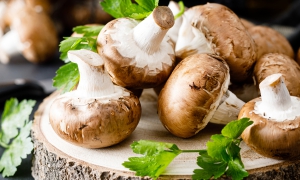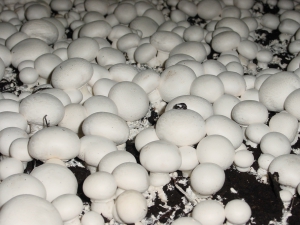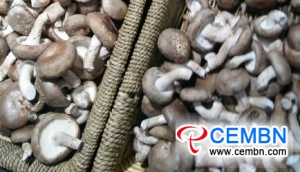Edible mushrooms could be used as a natural intervention to regulate blood sugar and improve metabolic health, a new study from Semmelweis University suggests. With global rates of type 2 diabetes (T2DM) on the rise, the researchers shed light on how bioactive compounds in medicinal mushrooms, such as polysaccharides and terpenoids, may help prevent or alleviate insulin resistance (IR).
Common mushrooms like white button (Agaricus bisporus), shiitake (Lentinula edodes), and oyster (Pleurotus ostreatus), now widely consumed as part of the Western diet, could serve as preventative or complementary treatments for managing insulin resistance, according to a comprehensive review recently published in the International Journal of Molecular Sciences.
IR occurs when the body’s cells fail to respond properly to insulin, causing glucose to build up in the bloodstream. Over time, this can lead to T2DM, a condition that affects an estimated 830 million people worldwide, as data from the World Health Organization shows.
The bioactive components in mushrooms include polysaccharides, terpenoids, phenolic compounds, and bioactive proteins, along with essential vitamins and minerals. These compounds interact with key metabolic processes to promote better insulin sensitivity and overall metabolic health.
For example, indigestible polysaccharides, a major fibre component of mushrooms, contribute to metabolic balance by feeding beneficial gut bacteria. These bacteria support nutrient absorption, strengthen the intestinal barrier, and lower chronic inflammation - an important factor in insulin resistance. Additionally, polysaccharides reduce sugar and fat absorption, which aids in weight management, crucial for both preventing and managing diabetes.
"Recent research has highlighted the significant impact of gut health on conditions like obesity and type 2 diabetes," explains Dr Zsuzsanna Németh, a biologist at Semmelweis University’s Department of Internal Medicine and Oncology and the study's lead author. "By nurturing gut bacteria through diet, we can improve insulin sensitivity and overall metabolic health."
Other ways of how bioactive components in mushrooms could improve IR:
- Modulating glucose absorption: Mushroom compounds regulate intestinal enzymes, slowing the rate at which glucose enters the bloodstream, thereby preventing sharp blood sugar spikes.
- Enhancing glucose uptake: By improving insulin signaling pathways, bioactive components help transport glucose more efficiently into muscle and fat cells.
- Balancing insulin production: Mushrooms can stimulate insulin secretion by pancreatic β-cells and protect them from cell death by increasing the expression of the GLP-1 hormone, helping to maintain healthy blood sugar levels.
- Optimising lipid metabolism: By promoting the use of free fatty acids as an energy source, mushrooms reduce harmful fat accumulation and support healthier muscle function.
- Improving adipose tissue function: Pathologically enlarged fat tissue produces pro-inflammatory substances, contributing to insulin resistance. Medicinal mushrooms may help restore optimal fat storage and release while promoting the production of anti-inflammatory adiponectin, thereby improving metabolic balance.
- “Our study reveals the remarkable potential of natural compounds in mushrooms to address key metabolic pathways," adds Dr Németh. "As interest grows in non-pharmacological approaches to disease prevention, this opens up exciting possibilities for using edible medicinal mushrooms as complementary agents in diabetes management."
However, Dr. Németh advises that in cases of illness, supplemental mushrooms should be consumed as part of a balanced diet and under the guidance of healthcare professionals.
Please read the full article here
For press enquiries and interviews please email our press office: This email address is being protected from spambots. You need JavaScript enabled to view it.
Mushrooms: A Superfood packed with health
Mushrooms, loved for their versatility and delicious taste, rightly deserve the title of 'superfood'. Whether you prefer chanterelles, oyster mushrooms, shiitake or portobello, mushrooms offer a wealth of health benefits.
These nutritional powerhouses are not only tasty but also extremely healthy. With minimal calories, they provide an abundance of protein, fiber, potassium, B vitamins and selenium. These low-fat treats are not only beneficial for weight management, but also for the heart. Mushrooms also strengthen your resistance thanks to their dietary fiber content.
As a natural energy boost, mushrooms are rich in B vitamins. In addition, they play a crucial role in the production of vitamin D, which is important for strong bones, teeth, muscles and a well-functioning immune system.
Scientific research has shown that mushrooms also have neuroprotective effects. As such, they can play an important role in promoting brain health and even help prevent conditions such as Alzheimer's.
Mushrooms are therefore not just a superfood, but a true 'super... super... superfood'. By regularly adding mushrooms to your meals, you give a powerful boost to your overall health.
Shiitake happens: Mushrooms to play key role in immunity nutrition and health, concludes report
Concerns over immune health and the pandemic has thrust the humble mushroom into the spotlight as experts hail the fungi’s ability to interact with gut microbes that influence healthy immune and inflammatory responses.
Please read the full article here.
Source: Nutra Ingredients
Liaoning Dandong Market: Analysis of Mushroom Price
According to mushroom quotation provided by Liaoning Dandong Vegetable Wholesale Market, on July 8, Shiitake mushroom, Superior Shiitake mushroom, Button mushroom and Agrocybe cylindracea are 4 varieties that show price fall.
1. Price of Shiitake mushroom has dropped from 10 to 8 CNY per kg, indicating 20% of decline range.
2. Price of Superior Shiitake mushroom has dropped from 14 to 12 CNY per kg, indicating 14% of decline range.
3. Price of Button mushroom has dropped from 18 to 16 CNY per kg, indicating 11% of decline range.
4. Price of Agrocybe cylindracea has dropped from 14 to 12 CNY per kg, indicating 14% of decline range.
On the contrary, on July 8, Oyster mushroom, King oyster mushroom, Enoki mushroom and Cordyceps militaris are 4 varieties that show price rise.
1. Price of Oyster mushroom has risen from 8 to 16 CNY per kg, indicating 100% of increase range.
2. Price of King oyster mushroom has risen from 6.5 to 7 CNY per kg, indicating 7% of increase range.
3. Price of Enoki mushroom has risen from 4 to 4.5 CNY per kg, indicating 12% of increase range.
4. Price of Cordyceps militaris has risen from 14 to 16 CNY per kg, indicating 14% of increase range.
“Price of White beech mushroom and Brown Shimeji mushroom is respectively at 8.3 and 8.33 CNY per kg in our market,” introduces general manager of Liaoning Dandong Vegetable Wholesale Market passionately.
On May 7, in Lijia Mushroom Stick Professional Cooperative located in Badu Town, Longquan City, Zhejiang Province of China, the first full-automatic inoculation machine of Shiitake mushroom’s Solid Spawn has gotten its success in trial production, rate of inoculation goes faster than 500 sticks. For the first batch of Shiitake mushroom sticks (2000 sticks), percentage of success reaches 98%.
“This full-automatic inoculation machine realizes automatic hole-punching, spawn-input and bagging, inoculation speed attains at least 500 sticks per hour, percentage of success reaches 98% while staff employment could be reduced by half,” introduces person in charge of the project warmly, adding that the machine comprehensively lifts the inoculation efficiency of mushroom sticks. Most importantly, it holds crucial realistic significance to the acceleration of transformation & development, and competitiveness improvement of mushroom industry in Longquan City.
























